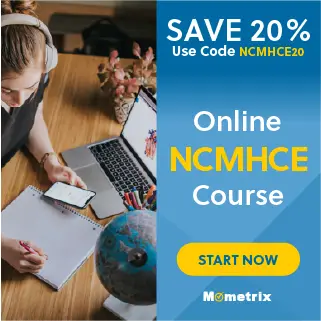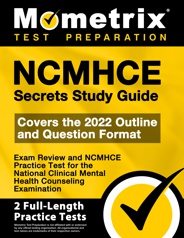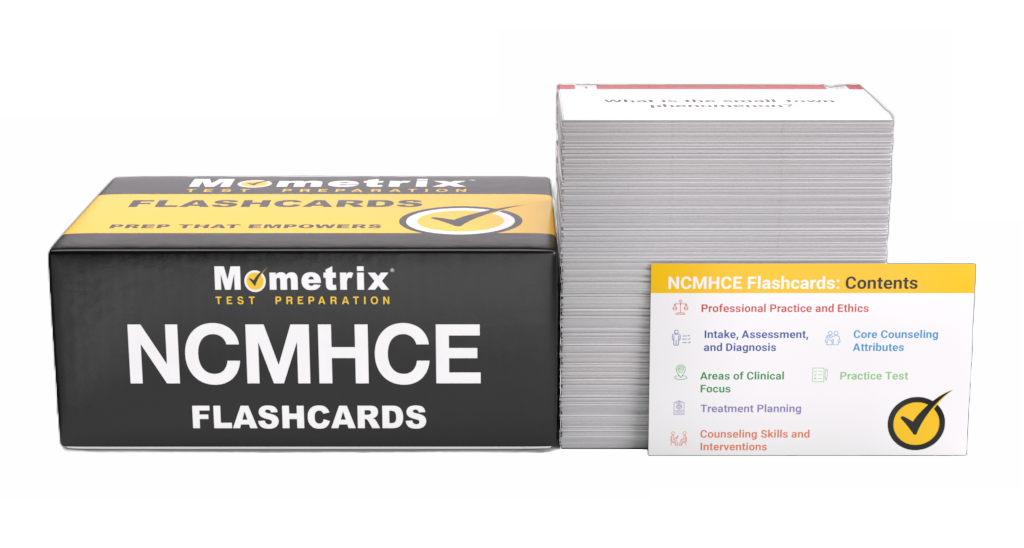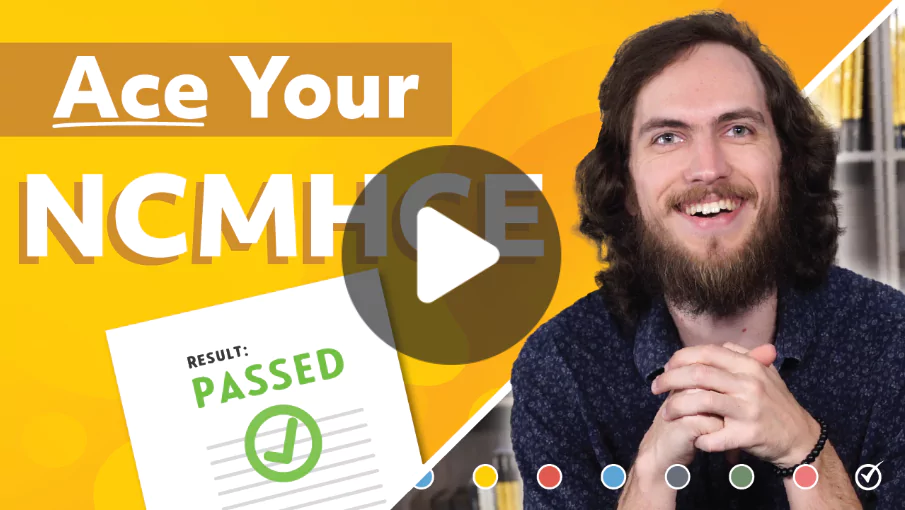A passing score on the National Clinical Mental Health Counseling Examination (NCMHCE) is required for licensure in some states. It is one of the requirements for both the National Certified Counselor (NCC) and Certified Clinical Mental Health Counselor (CCMHC) certification. Successful completion of the exam and certification demonstrates your commitment to the profession and dedication to continued learning within the field.
Click “Start Test” above to take a free NCMHCE practice test!
NCMHCE Format
The NCMHCE consists of 11 counseling cases designed to evaluate your capability to make vital clinical decisions that pertain to the health and well-being of figurative mental health clients you may encounter in real-world situations. Each case will include one narrative and 9-15 multiple-choice questions.
The exam is split into three parts:
Component 1: Intake
This part of the exam provides you with basic, introductory client information such as how old they are, whether they are male or female, and what problems they are presenting with. You will also be given the setting, as well as the presenting concerns and diagnosis of the client.
Component 2: Clinical Session I
In this part of the exam, you will work on the presenting concerns with the client by using evidence-based approaches.
Component 3: Clinical Session II
In this part of the exam, you will simply be continuing the work that you began in the last component.
At the beginning of each counseling case, you will be provided with the client’s initial diagnosis. You will then be asked to evaluate how that judgment was initially made. In some instances, you may have to either provide one or more co-occurring diagnoses or monitor the therapeutic relationship and change the diagnosis as it evolves and changes.
NCMHCE Exam Outline
In total, the NCMHCE contains between 130 and 150 questions and has a time limit of 225 minutes.
The questions on the exam cover the following five content domains.
1. Professional Practice and Ethics (15%)
The questions in this domain assess your ability to maintain proper administrative and clinical protocols.
These are some of the specific topics that are covered:
- Statistical concepts and methods in research
- Uses and limits of social media
- Reviewing client records
- Legal and ethical counseling
- Advocation of client and professional issues
- Supervision
- Obtaining informed consent
- Reviewing fees, payments, and insurance benefits
- Confidentiality in the space of electronic communication
- Provision of information to third parties
- Counselor and client roles
2. Intake, Assessment, and Diagnosis (25%)
The questions in this domain assess your knowledge and skills regarding the conduction of client intake, assessment, and diagnosis.
These are some of the specific topics that are covered:
- Conducting a biophysical interview
- Determining the level of care needed
- Assessing for trauma
- Evaluating counseling effectiveness
- Conducting an initial interview
- Using formal and informal observations
- Assessing for substance abuse
- Evaluation of interactional dynamics
- Considering co-occurring diagnoses
- Screening clients for appropriate services
- Obtaining client self-reports
3. Treatment Planning (15%)
The questions in this domain assess your knowledge and skills regarding the development of an effective course of treatment.
These are some of the specific topics that are covered:
- Establishing treatment goals and objectives by collaborating with the client
- Identifying strengths and barriers related to goal attainment
- Referring to different treatment levels
- Guiding treatment planning
- Following up after client discharge
- Reviewing the treatment plan and making any necessary revisions
- Integrating and maintaining therapeutic progress
4. Counseling Skills and Interventions (30%)
The questions in this domain assess your knowledge and skills pertaining to effective counseling strategies.
These are some of the specific topics that are covered:
- Aligning intervention with counseling modalities and with the client’s developmental level
- Addressing addiction issues
- Exploring religious values
- Facilitating trust and safety
- Developing safety plans and conflict-resolution strategies
- Providing psychoeducation for the client
- Modeling appropriate feedback reception
- Using structured activities
- Explaining phases in the group process
- Using self-disclosure
- Creating an intervention based on the group development stage
- Challenging harmful group behaviors
- Addressing the impact of a social support network
5. Core Counseling Attributes (15%)
The questions in this domain assess your overall traits, behaviors, and disposition.
These are some of the specific topics that are covered:
- Genuineness
- Empathy
- Respect for and acceptance of diversity
- Congruence
- Positive regards
- Resolution and tolerance of conflict
- Foundational listening, reflecting, and attending skills
- Sensitivity to multicultural issues, as well as gender orientation and gender issues

Check Out Mometrix's NCMHCE Study Guide
Get practice questions, video tutorials, and detailed study lessons
Get Your Study Guide
Overview Video
5 Challenging NCMHCE Practice Questions
Now that you know how to approach practice tests, try your hand at some targeted practice on your own!
Over the last year, we’ve compiled the data from nearly 2,000 test-takers who tried their hand at the practice test at the top of this page. According to the data, there’s one case study that around 70% of people struggled to answer questions about.
First, read the full case study. Then, answer each question and read through the answer explanation, whether you got the answer right or wrong. This will help you ensure you’ve got the topic mastered.
Whether you struggled with these questions or aced them on your first try, be sure to take the full practice test to get a better idea of how prepared you really are!
Read the full case study
Part One: Intake
CLIENT
- Age: 45
- Sex: Male
- Gender: Male
- Sexuality: Heterosexual
- Ethnicity: Caucasian
- Relationship Status: Divorced, single
- Counseling Setting: Private practice
- Type of Counseling: Individual counseling
- Presenting Problem: The client is experiencing difficulty in functioning in all areas of his life due to inhalant use.
- Diagnosis: Inhalant use disorder, severe (F18.20)
PRESENTING PROBLEM
You are a licensed counselor working in a private practice. You specialize in substance use disorders. The client comes into the session, is very friendly, and states that although his sessions are court ordered, he wants to get help with his inhalant use. The client spent the first half of the session explaining what happened to lead to him getting his third charge of driving under the influence of inhalants. The client says that he had twin sons 13 years ago and they both were in the ICU; one of his sons died after about a month. The client began drinking alcohol to excess daily for about 6 months, which then transitioned to inhalant use. The client says that he uses contact cement, model glue, paint, and permanent markers to become intoxicated.
The client identified the following symptoms of inhalant use disorder: increase in frequency and amount of use over the past 5 years, several failed attempts at cessation of inhalant use, craving inhalants throughout every day, losing several jobs because of his inability to get to work on time due to inhalant use, use that has affected his ability to have visits with his children and maintain employment, use that increases the risk of harm to himself and others such as driving under the influence, increased tolerance, and continued use even when he knows it is negatively affecting his life. The client wants to become sober, improve his relationship with his children, and maintain employment.
MENTAL STATUS EXAM
The client is oriented to person, place, time, and situation. The client does not appear to be under the influence of inhalants because he does not display any symptoms of use. The client is friendly and engaged in the session.
FAMILY HISTORY
The client has three sons that are 11, 13, and 16 years old. The client is divorced as of 3 years prior and reports a contentious relationship with his ex-wife due to his difficulty following through with visits with their children. The client and his ex-wife were married for 17 years and dated for about 5 years before they were married. The client states that he loves his ex-wife but that she has currently been dating another man for the past 2 years and he knows they likely will not reconcile. He says that he understands why she does not want to be with him, and he thinks that he is not good for her or his children at this time.
Part Two: Sixth Session, 3 Weeks After the Initial Intake
The client comes into the session and looks tired, as evidenced by the darkness under his eyes and he is walking slowly. The client starts talking immediately about 2 days prior when he went to his ex-wife’s house to pick up his kids for a visit and she told him that although she cannot stop this visit, due to recent inhalant use a few weeks ago, she talked with her lawyer about changing the status of his future visits to supervised visits, and she will be returning to court to do so.
The client says that he spent time with his kids and that when he left, he stopped by a store to get acetone and that he used this substance that night. The client expresses guilt and shame surrounding using, which led to him using the acetone the next day. The day after he used inhalants, the client stated that he was thinking, “I already broke my sobriety; I may as well huff so that I can feel better.” You empathize with the client regarding the situation because you can see how this would be distressing for him. The client says that his children seem bored when they are with him, as if they want to go home, which induces feelings of shame and sadness.
Part Three: Fourteenth Session, 7 Weeks After the Initial Intake
You meet with the client after he requested an emergency appointment. The client says that he had a supervised visit with his children and he had used inhalants prior to the visit because he was anxious. The supervisor noted the intoxication and ended the visit early. The client says that this was 3 days ago and that he has used inhalants several times daily since the visitation. Due to his intoxication at the visit, all future visits have been canceled until the next hearing in court regarding visitations. The client says that he has been very depressed and that is why he is using inhalants.
During the session, the client asks if he can go to the lobby to get water and you tell him that this is fine. The client returns, sits down, and appears listless because he is not displaying any emotion and has a very flat affect. You suspect that he is now intoxicated.
1. When discussing the informed consent form, you cover the risks of counseling. Which one of the following is NOT an expected risk of counseling?
2. All of the following are possible symptoms of inhalant use, EXCEPT
3. When considering treatment goals, all of the following are indicated areas to explore, EXCEPT
4. Which one of the following BEST defines acceptance and commitment therapy?
5. The client’s probation officer requests session progress notes from the time with your client due to it being court-ordered therapy. Which one of the following statements is TRUE regarding court-ordered therapy?
Registration
When you decide to register for the examination, you may do so either online (the preferred method) or via a paper registration form. You will be required to pay a $275 fee for the registration, either online with a credit card or with a cashier’s check or money order with a paper registration. These fees are not refundable or transferable and do expire if the NCMHCE exam registration process has not been completed within one year’s time.
You may register to take the NCMHCE exam at any of the 250+ testing centers throughout the United States. Testing dates are typically available in the first two weeks of every month on a first-come-first-served basis without application deadlines, though available testing dates and times will be indicated when you go to register for the examination. Exceptions include recognized holidays.
Once you have completed the registration process, you will have six months to take the examination, or you forfeit both the registration and fees. If you do not successfully pass the exam, you may register to test again after a three-month waiting period. You will be required to pay the associated fees each time you register.
Scheduling Your Test
You may schedule a testing date to take the NCMHCE exam after you have successfully completed the registration process. Your candidate ID number will be sent via email. This number will be needed in order for you to schedule an appointment to take the exam either through online scheduling (preferred) or on the telephone. You will be asked to confirm your chosen location, date, and time for your examination, in addition to being given a time you will be expected to report to the testing center on test day. Take note of this time. You will not receive any further communications from the test administrators or testing location leading up to your appointment.
Rescheduling
You may reschedule your appointment any time up to 24 hours prior. However, there will be a $50 fee to reschedule your appointment if you do so within 7 days of the originally scheduled appointment. In the event that you need or plan to reschedule your appointment but fail to do so at least 24 hours before your scheduled time, arrive more than 15 minutes late for your appointment or fail to report to your designated testing center at your scheduled appointment time for any reason, you will forfeit both your registration and paid fees. To reregister for the examination, you will be required to submit a separate registration and fees.
If the examination needs to be rescheduled due to inclement weather, an emergency, or a power outage, you will be notified by e-mail or telephone with rescheduling procedures. Cancellation is up to the discretion of the respective testing centers and is usually determined based on whether testing center personnel are able to open the facility. In the event of a power failure in the middle of an exam administration, you will be able to restart the exam where you left off before the interruption.
Test Day
On your testing day, try to arrive at least 15 minutes prior to your scheduled appointment time. You will be required to present two forms of identification, one of which must have a photograph. If you fail to provide appropriate identification and are not admitted to the testing center, it will be written as a missed appointment and result in forfeiture of your examination fee. Know that the name you used on your test registration and the name presented on your current photo ID must match, both must be current, and both should have your signature as you will be required to sign a roster for the testing center administrator to verify your identity. The administrator can accept the following forms of identification, but note that whichever form you use must be current:
- Driver’s license
- State ID card
- Passport
- Military ID card
Temporary identification, including employment and student ID cards, is not acceptable.
After confirming your identity, you will be directed to a testing carrel. When you begin the examination, you will first be required to agree to the terms of the nondisclosure agreement (NDA) before proceeding to take the NCMHCE examination. It is important to note that you may not bring any personal items into the testing room with you, including cell phones or cameras, and no testing materials may leave the testing location as all questions are copyrighted. All testing materials must be returned to the proctor upon completion of the exam or you will not receive your score report.
Taking the Examination
If you prepared for the NCMHCE exam by taking an NCMHCE practice exam, you should be familiar with the examination screen, which includes two windows:
- The Scenario Window on the left side of the screen displays the simulation you are currently working on.
- The Options Window on the right side of the screen displays section you are currently working in. This window will also include instructions, such as how many responses you are to choose.
Once you have submitted a response, you cannot unselect it as your submission reveals information about that selection. To review previous sections and feedback for responses, go to the top right-hand portion of your testing screen. Here, you will be able to view a review screen of your progress on the current case.
Receiving Your Scores
Upon successful completion of the examination, you will be able to receive an unofficial score report from the exam proctor which will indicate a pass or fail. Scores are determined solely based on the individual’s performance on the exam and are not compared to or influenced by the performance of other candidates. You will need to receive a passing score for both the Information Gathering and Decision-Making sections.
Passing scores and additional requirements for licensure are determined by the State Board, so be sure to verify what requirements you will need to meet prior to beginning the registration process. Passing scores will be sent to your state licensure board within 30 days. If you do not pass the exam, you may take it again after a 30-day waiting period.
Check Out Mometrix's NCMHCE Flashcards
Get complex subjects broken down into easily understandable concepts
Get Your Flashcards
NCMHCE Online Prep Course
If you want to be fully prepared, Mometrix offers an online NCMHCE prep course designed to give you everything you need to succeed!
Here’s what you’ll find in the NCMHCE course:
- 80+ Review Lessons Covering Every Topic
- Over 750 NCMHCE Practice Questions
- 30+ Video Tutorials
- 500+ Digital Flashcards
- Money-back Guarantee
- Mobile Access
Everyone learns differently, so we’ve tailored the NCMHCE online prep course to ensure every learner has what they need to prepare for the NCMHCE exam.
Click below to check it out!
FAQs
Q
How is the NCMHCE scored?
A
Each section of the exam has a minimum number of points that are needed to be considered as passing. The points for each section are tallied and you are given a raw score for the entire exam.
Q
How much does it cost to take the NCMHCE?
A
To register to take the NCMHCE, you will be required to pay $275. This fee is nontransferable and nonrefundable.
Q
What does NCMHCE stand for?
A
NCMHCE stands for National Clinical Mental Health Counseling Examination.
Q
What is the NCMHCE exam?
A
The NCMHCE exam is a national certification that is required for those who wish to become a Certified Clinical Mental Health Counselor.
Q
How long do you have to take the NCMHCE?
A
The time limit for the exam is 3 hours and 45 minutes.



